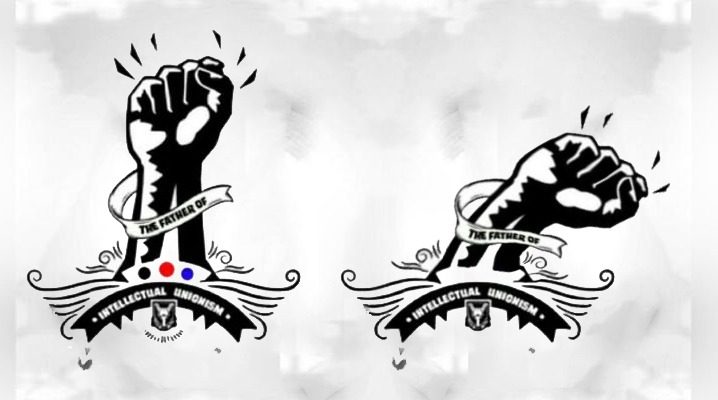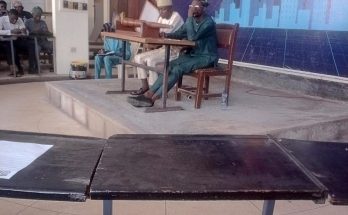Balogun Imunika
If a leader limps, all the others start limping, too. ~Kenyan Proverb
As much as we hate to hear it, the bitter truth is that students’ unionism in the University of Ibadan is in its final stage at best and dead at worst. What is now sadly seen as intellectual unionism or activism is the kowtow with the university management. Thus, when the management sneezes, the students catch a cold; when the management makes what it calls policies for the student’s welfare, the students are absent in decision making and when present, only say “yes sir” like an unpaid civil servant.
BACKGROUND

UI SU Congress in 2017. Ojo Aderemi (close to camera)
Students’ Unionism ended in 2017. That was when the then President of the Students’ Union, Ojo Aderemi, engaged in a total confrontation with the university management on pertinent issues that affect the students—one of which was the students paying for ID cards but were not given even as exams were to commence. I can’t forget how populous we were at the SUB foyer as we rubbed minds together on progressive ways forwards. We chose to protest. And that could have been evaded if the management had stuck to its promise. Ojo Aderemi said then that he repeatedly phoned the immediate past Vice-Chancellor, Idowu Olayinka, who had promised to reach out to him that same morning we protested. Prof Olayinka did not pick his calls. And we protested. This is to show the university management had been evading its promises. the university has not always been sincere in its promises. That was not the first time. What followed that time was rather precedented. We were all sent home. The SU was proscribed. And as you would expect, we did our exams without ID cards. Our cause was lost. But did that mean we fought for a wrong cause?
The sudden proscription of the Union plunged the students’ politics into a comatose. Not only that, the management went a step further—perhaps to show its supremacy—to penalise the SU executives and a few members of the Legislative council. Ojo Aderemi and others were given extra semesters. This left a scary imprint in the heart of the students as no one was ultimately willing to take up leadership positions for the fear of SDC. Students’ politics lost vigour, became sour, boring, and banal. We watched as the unfits became our leaders at the departments, faculties, and halls of residence. Our clamour for this to change was unheard—just like a dying man with a thin voice calling for help in the desert. We had no choice but to live with this horrible predicament, until…
PRESENT
It came rather shocking when we heard the news that the university management had revoked its decision on the proscription of the students’ union. The question of how true was this rented the air. But it was, true. The stage was set for the next set of executives. But the SU did not come with vibes associated with it. Campaigns were dull, unintelligent and it seemed the candidates did their thing anyhow in any direction. The management had said only first class and second class (upper division) aspirants would be allowed to contest. And yes, they did. In the end, we got leaders. At least it is better than not getting anything at all.
When the current SU executives were sworn in December 2019, President Akeju made a statement. He said he would ensure the partnership of the SU with the university management. When I heard him said that, I had thought what he meant is a better relationship with the management where we would be able to drive home our demands without any hindrance. I was wrong. What would later be the case is what we call padi-padi with the management. Almost all the issues that involved the students and the management intervened by the SU were lost to the management. President Akeju would then add platitudes justifying the management’s decision. And Akeju despite his nursery rhymes of diplomacy, has shown he isn’t at all diplomatic.
The first point of suspicion was when the SU disguised by battling with the management on the increment in the Technology fees. It was reported that the management pleaded with the students’ leaders to accept this increment. The last session, the students were forced to pay a sum of N6500 for the same fee and got 10GB for the whole session—considering the fact that you’ll have to find a place where there’s a strong Wifi connection to access the internet. In this session, the fee has been increased to N10000. Students paying that hefty sum for N3GB—some have not received the data at all!
The SU has shouted online that it won’t accept the increment, but in a meeting with management saw, in their purview, the reason for the increment. If it has stopped there, its acts would have been forgiven by history and forgotten by the students. But after agreeing with the management, the SU further—rather duplicitously—went to conduct a poll to ascertain whether or not the students accept the increment or not—after deciding with the management!
Another thing is: at the SU congress held on Monday, the Deputy Dean of Students said the University planned N80million for technology infrastructure. He added that the university does this in phases and it’s the money gotten from the technology fees we pay. Let’s do simple maths. We started paying for the technology fee last session. If that’s the inception, let’s call it Phase 1. Phase 1, we paid N6500. This session would be Phase 2. Phase 2, we paid N10000 (that’s N3500 extra). And yet, the university is not close to becoming technologically independent. This translates that when the University gets to Phase 3, 4, 5, the technology fee would be increased subsequently. And the students would still pay. Maybe this is a well-known issue I don’t want to bore the readers with. But as you read, I want you to start putting two and two together as we say here, so we can arrive at the same logic.
VIRTUAL RESUMPTION, ITS HACKS
Despite not being IT conducive enough, the University stubbornly clung to virtual resumption. Dr. Demola Lewis said Monday that the University bore the pains and brunt for the continued existence of virtual learning. We are all know how effective virtual learning has been—beautiful and well-orchestrated. Now, it considers physical resumption for the remainder of the session. Hostels would be re-opened, with priority given to some select students. The university did not stop there. There are propositions that the students would have to pay N30000 as accommodation fees. Although the university has not made this official, a reliable source has confirmed this development. The students kicked. The SU said it proposed N24000 because the University would have to implement Covid-19 Protocols and take 50% capacity of the halls. Students still kicked, like a little child kicking his legs in the air because his mother had failed him. It was for this reason a Congress was called.
PASSIVE CONGRESS, DEFLECTIVE LEADERS
Before the Congress, this writer was privy to some of the backyard decisions made by the SU and some student-leaders. One of which was to show the justification of the amount proposed for the university to the students. The majority of them rejected the idea of total confrontation with the management even when this does not always mean protest.

UISU Congress, 2021. Akeju (in sneakers)
At the Congress, I was shocked by the scanty number of participants, who are exotically called student leaders. Akeju introduced the business of the day after a parallel and intersecting speech which can be summarised as—whether or not the students should accept N30000 as the accommodation fee. As if you would expect, fingers flew up, which would deceive you that there’s still the spirit of Aluta, but on hearing what these “great minds” had to say, you realise that Aluta cannot continua. Student leaders argued back and forth like our Senators and Honourables at the National Assembly who would not later reach a decision.
At the Congress, I found an addition from one Comrade Ajiboye rather spurious. I can’t note his constituency because he wasn’t audible enough—like someone who wants to utter puerile doodling and still wants to cover his shame at the same time. He said N30000 is okay, that he pays N60000 monthly as Electricity tariff. What’s the correlation, even when N60000 isn’t feasible for someone who likely stays in the shanty part of Agbowo? You see, the problems of the students are the students themselves.
Another Orimoloye Emmanuel, the Hall Chairman of Lord Tedder Hall, also known as Honourable Short, would give a speech short of intelligence. While others were trying to see if the amount can be reduced, he was talking about the compulsion of shirts and hall dues. What’s the correlation? I don’t want to go on, reeling the nonsense some students’ leaders said because it affects my mental health. You know your leaders, ask them if they had indeed represented you well.
Some of the student-leaders argued for N30000, others argued for N24000. Others said half of the proposed amount is okay. And more than half were just looking. Should there have been deliberation on these amounts before? Akeju said the University would be running at a loss taking half capacity. I know. We know. And that’s not our business. All other top companies suffered losses because of the Pandemic. The concern is that when the University takes N30000 to provide accommodation for a semester, there is the highest possibility that it would increase the fee by the next session—possibly N40000 or N50000. How will the students pay? Dr. Lewis said the Federal Government does not finance public universities, that it wants to “kill” education. He asked rhetorically, “Shall we help them?” I ask too: “Sir, the Federal Government does nothing to reduce the economic hardships, yet the University still increased the fees. Shall the University help the FG to cause more hardships?” This is a genuine question that must be answered.
But why is the Deputy Dean of Students even at the Congress? Akeju, the MC at the Congress, said Dr. Lewis had a thing or two to say. He threw the decision of whether or not he should be allowed in. And your students’ leaders accepted. Dr. Lewis would later give a soulful speech on how the university is sincere in its decision regarding the students. And the students’ leaders bought it. Well, that’s the power of language, it can shape your opinion and distort your thoughts. The Congress would not finally reach an agreement, however. It dispersed.
DO WE STILL HAVE A VOICE?
In conclusion, there are multiple shreds of evidence that those who parade themselves as student-leaders do not know what it is to be one. They are just opportunists who think forcing their ways into leadership positions and being addressed as Presidents is what it takes to be a leader. Even the SU is not left out as there’s no unionism. How many students can boast of total faith in the SU? When our representatives scurry away at the mention of the word, management, do the students still have a voice?
This is a genuine call to the SU and other students’ leaders to redefine their focus as the students cannot go about adapting to the decisions of the management—when we are not pleased. If we can reason along with the management, why can’t the management reason along with us? It should be a win-win situation, not the other way. I fear if this dangerous trend continues, then our voice, the students’ voice, which now is a whisper would be silenced finally. And of the greatest gbo-gbo gba-gbaa would adopt a final reticence. I hope this wouldn’t be the case. Dear students, you have a role in ensuring our representatives are responsible. Always remember that those who don’t care for you and I are actually in UI. All the best.




